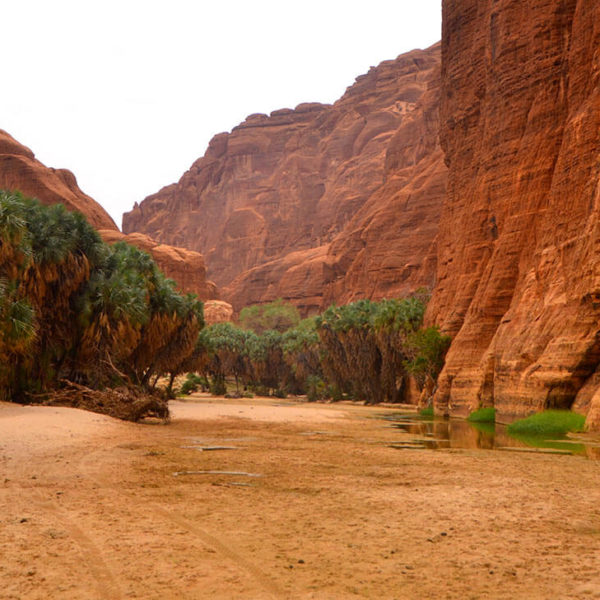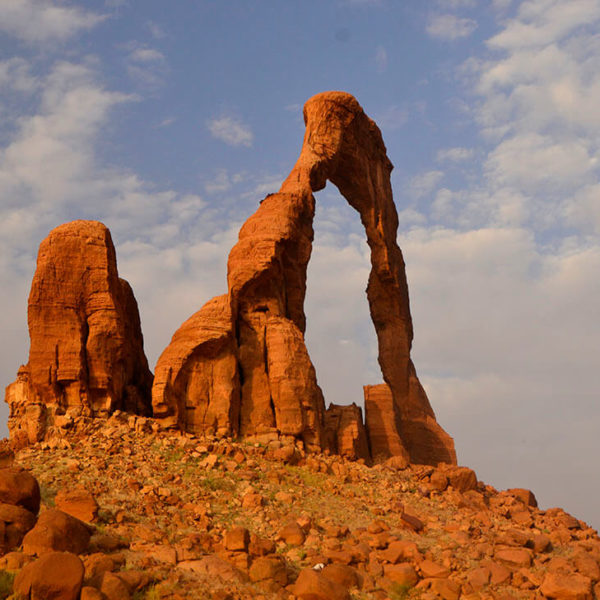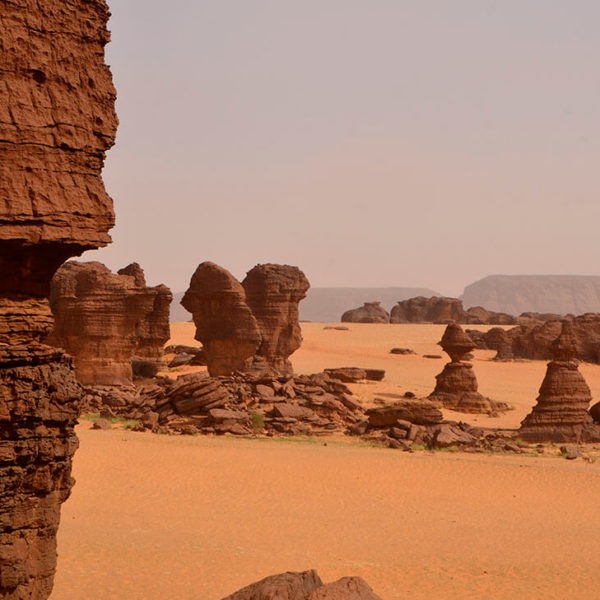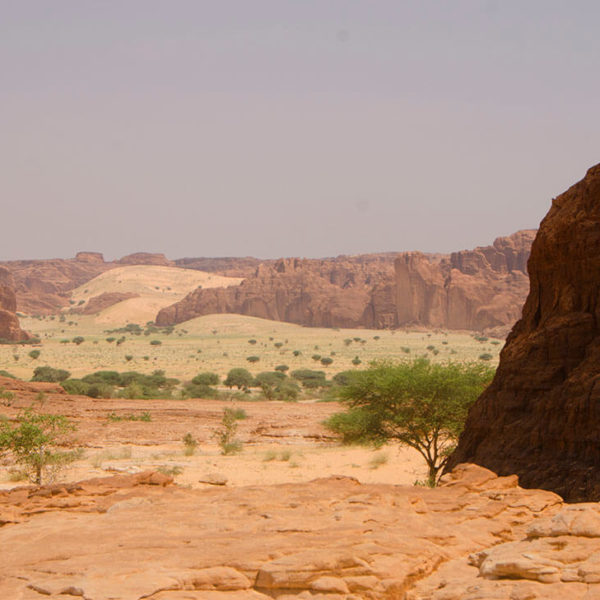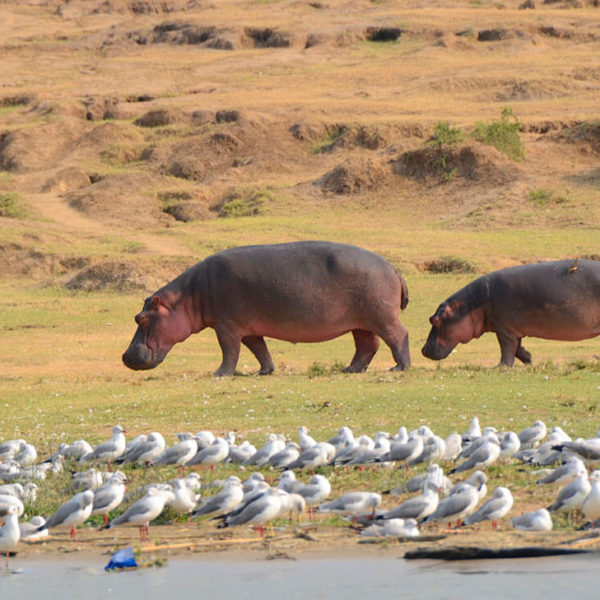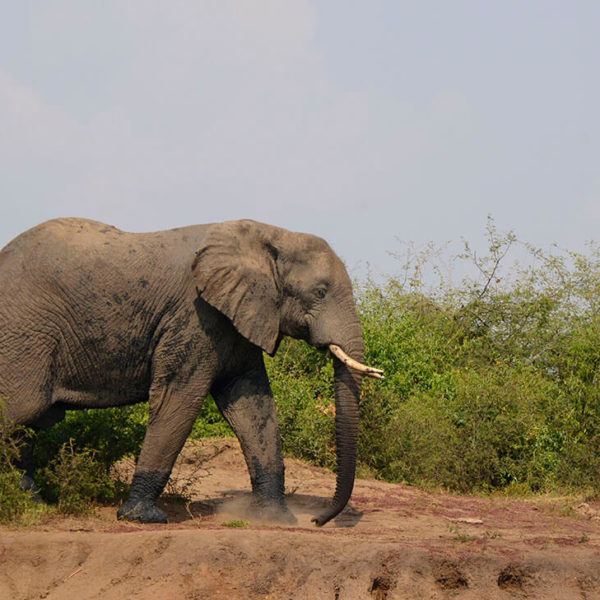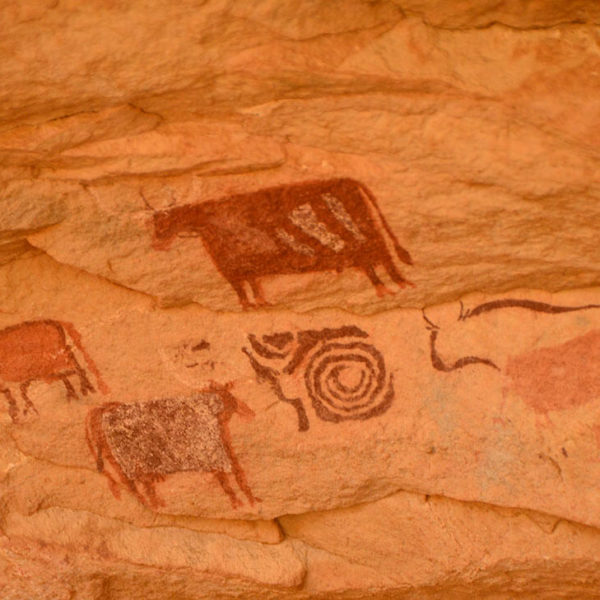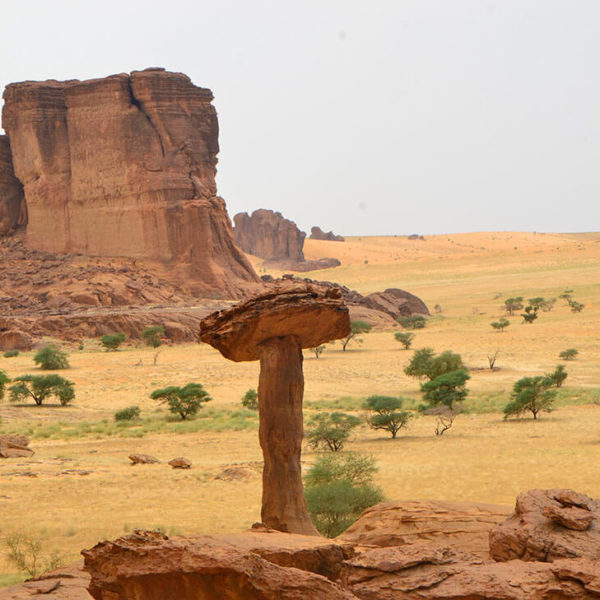Chad – North & South 15 days
The Republic of Chad is a country where the Saharan North meets the savannas of Central Africa. During our expedition we will see the best of what this country has to offer: the surreal and mesmerizing landscapes of Ennedi and the richness of nature in the Zakouma National Park.
This itinerary is an individual proposal that combines the two most important attractions of Chad.In view of its nature, the optimum time for this expedition is between ONovember and February.
itinerary
Arrival at the N’Djamena airport and transfer to the hotel. An organizational meeting will be held at the hotel. Dinner in one of local restaurants.
D.
After breakfast, transfer to the south-east. We will move in the Sahel and savanna zone. If possible, we will stop in the villages on the way: Sar Arab, Sar Kenga, Cole. We will sleep in tents near Bitkine.
B. L. D.
After breakfast, another day on the road – this time we will stop, if possible, in Baro, and then we will pass through Dalao. Overnight stay in Ngouri.
B.L.D.
Two full days of safari in one of the Earth’s most precious natural areas in North-East Africa. While travelling through Zakouma, we will be able to see the “classical” African large mammal species as well as numerous birds, reptiles and insects. Over 300 km2 of the protected savanna area and Sahel, and in addition numerous rivers and seasonal lakes forming in times of heavy rainfall.
B.L.D.
We will set off to the north-east. The landscape will gradually change – the green scenery will give way to rocks. We will stay overnight in tents outside of any villages or towns. Depending on the pace of our journey, on the evening of the eighth day or on the ninth day we will pass through Abeche, the second largest town of Chad. Having restocked our provisions, we will set off to Biltine – the last larger town before Ennedi.
B.L.D.
A visit in the uplands of Ennedi will be an opportunity to admire a whole spectrum of beauty of fantastic rock formations and spectacular landscapes. Mushroom-shaped landforms, rock arches, canyons, monumental citadels and many other forms make Ennedi exceptional in the whole of Africa. Over 4000 km2 of one of the most breathtaking landscapes on our planet. On the journey we will visit the Apsara Rock Citadel, the Habeiki Stone Forest, the Tobodo sandstone mushrooms and the d’Oyo Labyrinth. Moreover, we will see the second largest stone arch in the world – d’Aloba – and the Terkei arch. We will have a longer stop to enjoy the view of rocks resembling a wine bottle and an elephant head. But Ennedi is not only rocks – it is also a home to bustling wildlife. The best place for observation will be the natural water sources of Gulta Archei. During our stay we will also visit places where the ancient inhabitants left some amazing rock art and if the current residents invite us, we will pay them a visit at home.
B.L.D.
We will leave Ennedi and start our return journey to the Chad capital, N’Djamena. We should reach it on the fourteenth day in the afternoon. A brief visit at the local market to buy souvenirs – if we arrive late, we will go there for shopping next day in the morning. Farewell dinner in the evening of day 14.
B.L.D.
After breakfast, depending on the departure time, transfer to the airport.
B.
Practical information
- the length of the tour : 15 days in Africa;
- start of the trip: N’Djamena;
- end of the trip: N’Djamena;
- the highlights of this expedition: the Zakouma National Park in the south of Chad and the uplands of the Ennedi desert in the north. Apart from the beautiful natural features, a very important and interesting element of the tour is the close encounter with the culture and traditions of local inhabitants.
The tour will be an expedition to one of the regions of the world least visited by tourists. The tour is oriented on nature, sightseeing and cultural tourism. Because of the special nature of the visited places and of the expedition features, the travellers are required to be physically and mentally fit. Long car rides through the Saharan wilderness, often at more than +30°C, sleeping in tents without access to toilets and showers (except accommodation in the capital and in the Zakouma National Park) may be very tiresome and cause considerable discomfort. Furthermore, as the expedition will take place to very remote areas, during its course there will be practically no access to medical services, except for the capital of Chad. No long hikes or activities that require strenuous physical effort are envisaged during the tour. The itinerary was designed to enable best possible viewing of the places away from mass tourism routes, while meeting basic safety standards and ensuring comfort to the travellers. Bear in mind that areas in the northern part of Chad (Ennedi) are mostly inhabited by Muslims, which means the need to respect cultural differences and adhering to the appropriate dress code.
Depending on the political situation, the length of the tour and the order of visited places may change. In a situation of a serious threat to travellers’ safety, the tour may be cancelled. We will keep you updated as to whether the expedition is possible.
- Your passport must be valid for at least 6 months after the planned end of the tour.
- Before departure, you must obtain the tourist visa at one of your nearest embassies of the Republic of Chad. Having booked the tour, the travellers will receive a letter of invitation necessary for obtaining the visa. The completed visa application and two current colour photographs will also be necessary.
- To obtain a visa, you may use the services of visa agents or the help of BTP Adventure.
- You should take with you for the trip a photocopy of your passport (the photo page) and an additional ID document.
- Take with you for the trip the yellow vaccination booklet with certified valid yellow fever vaccination – it is impossible to enter the Republic of Chad without this document and vaccination.
- Before departure, we recommend a consultation with a family physician and a tropical medicine specialist.
- Vaccination against yellow fever, tetanus, diphtheria, viral hepatitis A and B, meningococci, typhus and meningitis is recommended.
- Despite a low risk, it is worth preparing to malaria prevention (Malarone or Lariam).
- There is a risk of dengue and tuberculosis at the places planned to be visited during the trip.
- We recommend visiting https://travelhealthpro.org.uk/countries.
- During our expedition, we will drink only bottled water. You should avoid ice in your beverages and eating raw or undercooked foods. Only private medical care exists in Chad, and this only in the capital.
- Because of difficult travelling and accommodation conditions and particularities of the country, good general health and physical fitness are necessary. Furthermore, your patience will definitely be tested and you should prepare for hardships of long journeys, lassitude and discomfort.
- Please take with you a first aid kit and a sufficient supply of your regular (prescription) medicines, if any. Some useful contents of the first aid kit:
- insect repellents – absolutely necessary
- high sun protection cream (recommended SPF 50)
- disinfectants, wound dressing materials
- analgesics and antipyretics
- antibiotics, as a precaution
- anti-diarrhoeals, electrolytes and vitamins
- The Republic of Chad is a country characterised by political instability and a major risk of an armed conflict. However, the actual terrorist threat or armed conflict risk is nowadays relatively low. We design our itineraries so as to avoid places that are potentially dangerous (Lake Chad or Tibesti Mountains).
- Owing to the good relations we have with local contractors, we keep following the news to be aware of any potential threats and safety risks. We also recommend you to read the latest news on the Foreign & Commonwealth Office website: https://www.gov.uk/foreign-travel-advice.
- During the tour, please take seriously the instructions of our contractors, guides and tour leader.
- It is very important to respect local customs and abide by local laws and regulations. You will receive the necessary information on an on-going-basis from your local guides and the tour leader.
- It is strictly prohibited to take photos and make video recordings at military and police installations and at airports. You are also not allowed to take photos where people in military/police uniforms are present!!!
- In Chad, it is prohibited to take pictures in the capital and in most of the visited towns and villages. Photographing people is possible only when they expressly agree to it. Taking pictures when the subjects have not allowed it often ends up with escalating aggressive behaviours.
The legal tender in the Republic of Chad is the Central African CFA franc. Currency exchange is possible only in the capital – at the airport and in hotels. You cannot change money anywhere else. Using payment cards is impossible outside the capital. The best foreign exchange rate is for euros. US dollars or UK pounds are not generally exchangeable.
For current foreign exchange rates see www.xe.com or install xe.com on your phone.
The official languages in the Republic of Chad are French and Arabic. Several dozen local languages are also spoken. . For self-guided tours, you must speak French, while English-speaking travellers must hire a local guide with a command of English.
The Republic of Chad is a multi-ethnic and multi-religious country. The South is inhabited by Christians of different rites. Sunni Muslims predominate in the North. Women do not have to wear headscarves.
It is very important to respect local customs and abide by local laws. You will receive the relevant information from your local guide or the tour leader.
The tour dates are proposed in periods of the best possible weather conditions at the sites included in the itinerary. The best time for expeditions to the Republic of Chad is the period between October and the end of February. Temperatures exceed +30°C during the day and +25°C at night. During our stay in Ennedi, the temperature may drop to +10/+5°C (in January and February). Apart from the southern part (Zakouma National Park), there should be no rainfall. High density of dust particles is a major issue. Sandstorms may appear. For detailed information see https://www.meteoblue.com/en.
Mobile network coverage is available in most towns and villages. However, it is absent in the areas of the Zakouma National Park and Ennedi. Purchase of a local SIM-card is complicated and of little benefit. Before the trip, please enquire with your mobile network operator whether they have a contract signed with operators in Chad and what the prices of call and SMS roaming are. To avoid a nasty surprise, we recommend disabling mobile data usage.
- Wi-Fi is available only in hotels in N’Djamena – the capital city – and in a handful of restaurants there.
- Power sockets of type D, E and F. Voltage 220 V, frequency 50 Hz.
- Additionally, we recommend taking a capacious power bank, solar charger or car charger. In national parks, in the course of car rides and in Ennedi, it will be possible to charge electronic equipment only from vehicle power supplies.
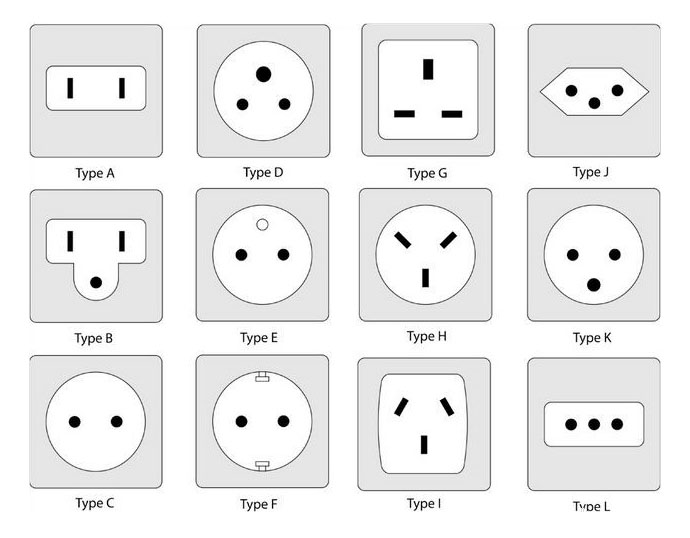
For climatic and cultural reasons, loose garments will be most appropriate: long trousers, long skirts, long-sleeved shirts, which can be easily washed and will quickly dry. The most comfortable footwear for the tour will be lightweight boots. Palladium brand boots are recommended. You may walk in open sandals but in towns as well as in savannas and desert regions this may be uncomfortable because of stones, thorny plants and sharp grasses. Hiking boots are not necessary. The following are worth taking:
- aluminium sleeping pad or light self-inflating mat and thin summer sleeping bag; we provide a mattress during the trip but taking your own pad or mat will improve your sleeping comfort
- sachet for documents and money
- wet wipes for body cleaning and antibacterial gels
- dry shampoo
- polar fleece jacket or warmer blouse, especially useful at evening and night times
- head cover and sunglasses – mandatory, the sun is no joke!
- comfortable summer clothes, useful during practically the whole trip
- light T-shirts/shirts
- useful odds and ends: torch, Swiss Army knife, sewing kit (usually is not needed but is not heavy and does not take much place), chargers, mug (for special occasions); inflatable neck pillow, useful on the plane and during car rides; small wallet for the local currency; books to pass the time on flights and car rides
Price
Price: £ 3290 p/p
During the expedition, we will travel by 4WD vehicles. Expected number of travellers in one vehicle: 3 + the driver. We will spend 7-9 hours travelling by car every day. The vehicles do not have air conditioning. Speed depends on the road surface conditions, terrain characteristics and number and length of stops.
We are not able to guarantee a uniform accommodation standard at each of the planned sites during the stay in the Republic of Chad. Our priorities are your comfort, appropriate location, character of the site and historical, cultural and natural values. We always place emphasis on the support of local community when selecting the sites for our accommodation. In general, rooms will be assigned on the assumption of two people sharing a twin room (rooms with individual bathrooms). The surcharges for single rooms are quoted in the “Price” section.
- Two overnight stays in 3-star hotels are planned during the trip, only in the capital, N’Djamena.
- During the stay in the Zakouma National Park, accommodation will be provided in lodges. Single or double occupancy rooms, usually with individual bathrooms.
- During the transfers and in Ennedi we will sleep in single or double tents. The amount of water for washing will be limited.
Meals according to the schedule B – breakfast, L – lunch, D – dinner and mineral water.
Meals while travelling and during the stay in Ennedi will be rather unvaried and repetitive, because of limited availability of foods and cooking facilities. Apart from the capital and larger towns, only very basic foods can be bought. For information about the local costs of living see https://www.numbeo.com/cost-of-living/.
Local guide.
Entrance fees and permit charges for the Zakouma National Park and Ennedi
Trip preparation, visa mediation, the invitation necessary to obtain a visa
Costs of the main flight to and from N’Djamena
Costs of flight tickets are not covered by the tour price. BTP Adventure does not directly arrange and buy tickets for international flights. However, we may suggest the best connections and airlines. For this purpose, contact us by e-mail or call us.
Visa costs and visa services.
- Insurance is not covered by the tour price. Having valid insurance is a condition for taking part in the trip. We recommend taking out insurance that will be appropriate for the planned itinerary and for your individual state of health and needs. Please send us the proof of your insurance contract.
- You can purchase insurance on your own on the website of Axa or any other insurance company: https://www.axa.co.uk/travel-insurance/.
- BTP Adventure may help you obtain adequate insurance cover. If you want our help, please contact us.
The price does not includes the cost of tips and porters’ fees.
Surcharge for a single room: 350 £
supplementary payment for the additional accommodation In the case of arrival or departure on a different date,
Meals other than those listed in the final itinerary.
Personal expenses and souvenirs.
FINAL NOTES
We will keep updating the detailed information on the safety and final itinerary of the tour. Before you decide to submit the booking form, please learn about the current political and sanitary situation in the Republic of Chad.
The planned expedition is an exclusive proposal prepared on the basis of our experience and knowledge of the local peculiarities and major sightseeing attractions of Chad.
We are committed to ensure the best possible and safe and, as far as feasible, comfortable travelling through this little-frequented and extremely interesting country.
You are welcome to take part! BTP Adventure.
3290 £ Per Person
The trip can be combined with an expedition to the Republic of Niger, Burkina Faso, Central African Republic, Cameroon, Nigeria and Mauritania.

